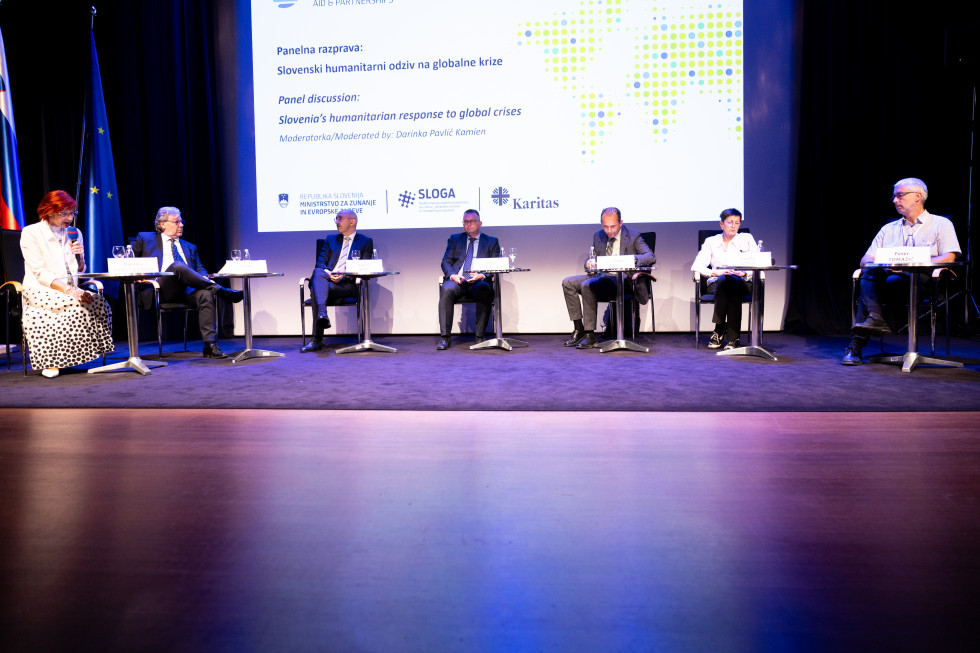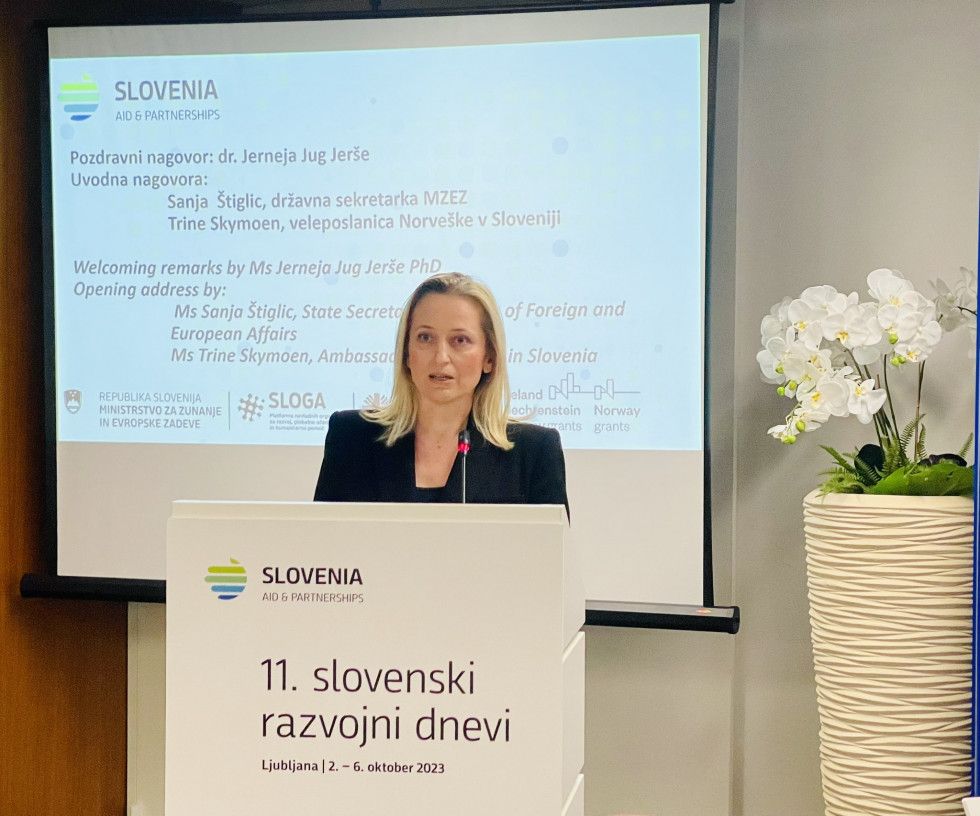11th Slovenian Development Days: Implementing solidarity through development cooperation
Six panel discussions with high-level guests from international organisations and the European Commission as well as Slovenian experts and representatives of governmental and non-governmental organisations and implementing institutions underscored the need for higher and more stable investments in development cooperation, conflict prevention and a faster response to humanitarian crises. This year also saw the opening of the first Slovenian Humanitarian Forum in the framework of the 11th Slovenian Development Days.
In her opening video address, Minister of Foreign and European Affairs Tanja Fajon pointed out that development and humanitarian challenges around the world are growing exponentially and that progress towards the Sustainable Development Goals is too slow. Therefore, it is vital that developed countries keep their commitments to contribute to a more balanced and equitable global development. She announced that after recovering from the catastrophic floods, the Slovenian government will be working to adopt an action plan to increase ODA in line with the commitments made.
In a video message, European Commissioner for International Partnerships Jutta Urpilainen said that in this era of climate change and geopolitical competition, the traditional approach to development aid is not enough. She mentioned Slovenia as an important partner in the field of development cooperation, adding that collaboration between widest possible circle of different stakeholders is needed.
UNCTAD Secretary-General Rebeca Grynspan Mayufis cautioned that countries are not doing enough to meet their targets, saying that at this rate, only 15% of the targets could be met by 2030. To address this challenge, we need three things: a multilateral debt restructuring mechanism, additional development aid and a global financial safety net.
On the panel "New visions for international partnerships and development cooperation: Partnerships in the maelstrom of crises", OCED Development Assistance Committee Chair Carsten Staur highlighted the importance of donor countries delivering on their commitments, aid effectiveness and the strategic objectives of development aid which are all aimed at reducing the development gap. State Secretary at the Ministry of the Environment, Climate and Energy Uroš Vajgl underlined the importance of climate finance in development aid and the need for Slovenia's increased contributions to international funds for this purpose. Ambassador-at-Large for Water Diplomacy Tanja Miškova spoke about the importance of water for peace, cross-border cooperation and the connection with climate change.
During the Slovenian Development Days event, President Nataša Pirc Musar inaugurated the first Slovenian Humanitarian Forum. In her address, she underscored the importance of international solidarity, emphasising how countries can join forces to address pressing global challenges such as climate change, poverty, hunger and migration. She added that international humanitarian solidarity can be a catalyst for peace, stability and justice. The awards were presented as part of the “Solidarity in Natural Disasters and Other Humanitarian Crises around the World” competition organised by Caritas Slovenia.
During the panel discussion titled "Humanitarian aid between needs and resources: How to respond in a faster, more effective, comprehensive and preventive way", high-ranking guests including European Commissioner for Crisis Management Janez Lenarčič, President of the International Committee of the Red Cross Mirjana Spoljaric Egger, State Secretary of the Ministry of Foreign and European Affairs Sanja Štiglic, Assistant Executive Director of the World Food Programme Ute Klamert, and VOICE President Dominic Crowley, agreed that the significant humanitarian disparity between available resources and pressing needs calls for not only increased funding but also heightened investment in development partnerships, conflict prevention, resilience building and preventive measures, coupled with improved anticipation and swifter action.
Panels were also carried out on "Slovenian development cooperation: Priorities, challenges and predictable financing" and on "Slovenia’s humanitarian response to global crises". Slovenian decision-makers and service providers presented their own work and shared their experiences, requirements and recommendations for the more effective implementation of development cooperation and humanitarian aid. The opening remarks were delivered by Marjeta Jager, Deputy Director-General for International Partnerships (European Commission) and Vojko Volk, State Secretary for International Relations, Office of the Prime Minister.
State Secretary Sanja Štiglic brought the first day of the Slovenian Development Days to a close by emphasising that an effective response to global development and humanitarian challenges can only be provided through partnerships. This principle will also guide Slovenia's efforts as a non-permanent member of the UN Security Council. She underscored the significance of bolstering the financial resources and capacities of service providers on the ground.
The second day of the event was dedicated to discussions regarding the engagement of the private sector in development cooperation. Participants underscored the pivotal role of partnerships with companies, which, as noted by State Secretary Štiglic, are viewed as catalysts for sustainable development.
The European Global Gateway strategy, the EU's response to the most pressing challenges of our time, was presented at the conference. This strategy is designed to foster smart, sustainable and secure connections in the realms of digital technology, energy and transportation. Additionally, it seeks to bolster health, education and research systems around the world. Edvin Skrt, Director-General of the Directorate for Development Cooperation and Humanitarian Aid, concluded his address by expressing his hope that the discussions will inspire and convince Slovenian companies to actively participate in development and humanitarian partnerships. He also encouraged service providers to strengthen their ties with the business community. He emphasised that the Ministry remains committed to fostering such partnerships in the future and concurred with several panellists who stressed that development cooperation is not merely a means of internationalising the European or Slovenian economy. Instead, it represents an endeavour to create a conducive business environment in developing countries, one from which Slovenian companies can also reap benefits.
As part of the event, the Ministry of Foreign and European Affairs, in collaboration with Caritas Slovenia and the Ljubljana Tourist Information Centre, organised an exhibition by photographer Alenka Slavinec titled "The Essence of Humanity". The exhibition features portraits of dedicated individuals engaged in humanitarian and development work across the globe, along with projects supported by the Ministry. The photographs will be on display along Krakovo Embankment in Ljubljana until 15 November.


